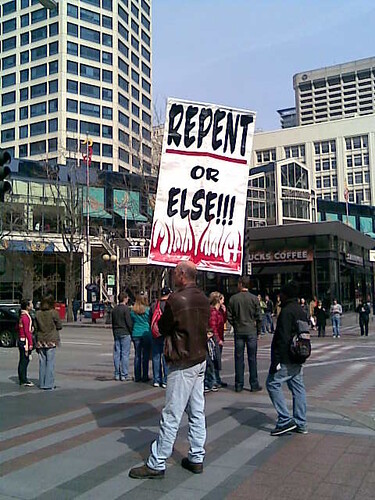Then God saw their works, that they turned from their evil way;
and God relented from the disaster that He had said He would bring upon them,
and He did not do it. (Jonah 3:10)
Christ’s final words to the church are not
the Great Commission in Matthew 28, but the messages to the seven churches in
Revelation 2-3. That message could be
summed up as, “Repent, or else!” It is a
steady drumbeat throughout the Bible—from Old Testament prophets, to the New
Testament herald John the Baptist, and it was the message of Jesus and His
Apostles. It is the Word God has given today
and every day—we must turn from our sin and come to God—or there will be dire
consequences. The second chapter of
Jonah features a repentant prophet, and the third chapter presents a repentant
people.
When we come to chapter three, the
repentance of Jonah is evident (v.1-4).
He turned from disobedience to devotion.
God gave his rebellious servant a second chance. Aren’t you thankful that God is the God of
second chances—and more? The Biblical
term for this is “longsuffering.” Repentance
would bring restoration of Jonah’s usefulness.
Recall how far Peter fell in denying Christ, but how the broken man, so
contrite, was reclaimed by grace. It can
happen to you. If the Devil has taken
you on a detour, how can you get back where you need to be? You get back on the right road where you got
off (v.2). Jonah wasn’t given a new
commission, but a recommission. A return
to obedience is repentance.
Then came the repentance of the people
(v.5-9). They turned from sin to
salvation. The preacher surely got their
attention—a lone Jew in a Gentile land, his skin maybe bleached white from the
whale’s gastric juices, seaweed draped around him, and smelling of rotting
fish! Quite a sight and quite a smell—quite
a sermon also! It was a simple message, “Yet forty days, and Nineveh shall be overthrown!” That was a pithy proclamation, pointed
and powerful. There is power in the Word
of God! When the people heard and heeded
the call to repentance an entire society was transformed. It began with one man’s faithful proclamation. If I didn’t believe in that possibility, I
wouldn’t be up this early, sharing this message. Notice the impact the Word had on the
government. Would to God there would be
a national day of repentance—of fasting and mourning over sin, which would be
declared and demonstrated in Washington, D.C.!
God may have said today, “Yet forty days, and America shall be
overthrown!”
If we repent, then God relents
(v.10). God turned from destruction to
delay. Nineveh was given a
reprieve. Later on, the Assyrians
returned to their wicked ways, and God brought the judgment He had promised
(read Nahum), but at this moment, God hits the pause button from the impending
judgment. The unchanging God who judges wickedness
is also unchanging in His willingness to forgive—if we change.
The conditions whereby God promised imminent
wrath were no longer present, but rather the contrite hearts that God promises
to receive were now found in Nineveh. his is the greatest miracle in Jonah’s
story. People are incredulous that he
survived being swallowed by a whale, yet that is nothing compared to the transformation
of a town through such a simple sermon!
Peter tells us that God is holding back His judgment to give us an
opportunity to repent (2 Pet.3:9). Will
we seize the opportunity? Repent, or
else!

No comments:
Post a Comment